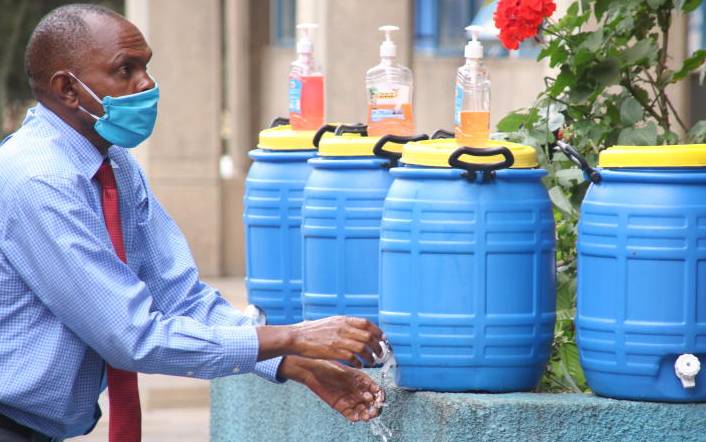
A staff member at Maji House, Nairobi, washes his hands at the setup handwashing units. [David Gichuru, Standard]
A section of Kenyans is unaware of some safety measures against the spread coronavirus such as avoiding handshake and proper hand wash even as the government preaches the gospel of hygiene to finish the virus.
A round two study by TIFA, released on Sunday, has revealed that some Kenyans living in low-income areas are yet to be thoroughly sensitised on the importance of hand hygiene to avert the spread of the disease.
According to the study, 46 per cent of the respondents said they were aware of wearing face masks as a safety measure. 41 per cent and 37 per cent of the respondents said they are aware of night curfew and travel restrictions in Nairobi as some of the policies to curb the spread of the virus respectively. But what is surprising is that at the tail end of the ranking of the responses, handwashing, sanitising hands and cleaning surfaces came as the least mentioned mechanisms at 1 per cent.
The study states: “By far, the measures imposed/advised by Government of which most respondents are aware are: mask-wearing in public, the night curfew, the Nairobi area ravel restrictions, and “keeping distant” when in public places.”
But when asked about what they felt was more effective to prevent against the spread of the virus, study reveals most Kenyans view “keeping distance” as the safest practice.
“Among all the required or recommended Covid-19 prevention measures of which respondents are aware, the single one deemed most effective is “keeping distance in public places” with 24 per cent mentions,” the TIFA study notes.
Titled “Covid-19 Global Pandemic in Nairobi’s Low-Income Areas: Effectiveness of Prevention Measures, Curfew Compliance and Enforcement, Nairobi Area Travel Restrictions”, the study was conducted in mid-June and was sponsored by The Canadian High Commission in Kenya and The Hanns Seidel Foundation Kenya.
The survey, which involved administering questionnaire, was taken by 579 youthful respondents from Nairobi’s low income earning areas like Huruma, Kibera, Mathare, Korogocho, Mukuru kwa Njenga, Kawangware estates.
It sought to examine the awareness of the disease and the impacts of its safety policies on Kenyans.
No reprieve yet?
President Uhuru Kenyatta is expected to address the nation and possibly lift, change or extend the night curfew and travel bans in Nairobi and Mombasa tomorrow. With regards to this, the study sought to probe the views of respondents towards the measures put in place by the State.
84 per cent of the respondents termed them necessary and was implemented to bring in social distancing while 12 per cent argued that it was imposed to prevent crime.
The study states: “The vast majority of respondents accept the Government’s justification for the curfew as a necessary measure to stop and reduce the spread of the Covid-19 virus, though a significant minority say they don’t know the reason for it. Very few view it mainly as a crime prevention measure.”
Prior to the June 6 address by President Uhuru, majority of the respondent (59 per cent) were hopeful that he would lift the travel restrictions into and outside Mombasa and Nairobi., the study reveals. The President extended the enforcement measures for an additional 30 days, which will expire on July 6.
On Saturday, the country registered 389 new cases which brought the total caseload to 7,577. This was after testing of 4,829 samples within 24 hours.
Nairobi produced the giant share of cases at 248. The other counties which registered cases included Kajiado, (36), Kiambu, (27), Mombasa, (23), Busia, (17), Machakos, (10), Migori, (9), Kitui, (6), Makueni, (3), Uasin Gishu, (3), Nakuru, (2), Kilifi, (2), Garissa, (1), Muranga, (1) and Narok, (1) case.
 The Standard Group Plc is a multi-media organization with investments in media platforms spanning newspaper print
operations, television, radio broadcasting, digital and online services. The Standard Group is recognized as a
leading multi-media house in Kenya with a key influence in matters of national and international interest.
The Standard Group Plc is a multi-media organization with investments in media platforms spanning newspaper print
operations, television, radio broadcasting, digital and online services. The Standard Group is recognized as a
leading multi-media house in Kenya with a key influence in matters of national and international interest.











